Failure to prepare correctly can cause muscle strains, cramps, and other injuries because of sudden physical exertion. Inadequate training can also lower endurance, strength, and overall performance, making it challenging to keep up with competitors.
You can train for cycling races by adding a longer ride to your weekly routine once you have become comfortable riding four or more days a week. Aim to do 3-6 weekly rides, each lasting 30-90 minutes. Every 1-3 weeks, do a long ride that lasts 3-8 hours. Preparing for long races such as century rides requires long rides in your routine.
This blog post, which includes some of the best ways to train for cycling races, helps you do your best on race day. Bucket up, and let’s ride on this exciting journey.
How To Train For Cycling Race: 9 Best Ways

Training for a cycling race demands dedication, strategic planning, and a structured approach to ensure peak performance on race day. Practical training is essential, whether you’re aiming to complete the race, achieve a personal best time, or compete for a top position. This comprehensive guide offers insights and tips to help you prepare efficiently for your next cycling race.
Set Clear Goals
Before delving into training, it’s crucial to establish clear goals that align with your aspirations for the race. Define whether you’re targeting road races, criteriums, mountain bike races, or cyclocross events. Each discipline requires specific training approaches tailored to the challenges of the race. Setting clear objectives will guide your training plan and focus your efforts toward achieving success on race day.
Create a Training Plan
Developing a structured training plan is critical to building the physical and mental readiness for a cycling race. Your plan should encompass a balanced mix of endurance rides, interval training, strength exercises, and essential rest days. Here’s a basic outline to consider:
- Endurance Rides: To build endurance, enhance your stamina with long, steady rides at a moderate pace. Aim for at least one extended ride per week.
- Interval Training: Boost your speed and power through high-intensity interval training (HIIT). Perform short bursts of intense effort and recovery periods to improve performance.
- Strength Training: Strengthen your core, legs, and upper body with targeted exercises to enhance overall cycling performance and prevent injuries.
- Rest Days: Prioritize rest and recovery to allow your body to recuperate and adapt to training stress effectively.
Focus on Nutrition
Proper nutrition is vital in supporting your training efforts and post-ride recovery. Consider the following nutritional guidelines:
- Balanced Diet: Eat plenty of protein, carbohydrates, and healthy fats to promote energy levels and support muscle recovery.
- Hydration: Stay adequately hydrated by drinking water throughout the day and during your rides to maintain optimal performance.
- Pre-Ride Fuel: Consume a carbohydrate-rich meal 2-3 hours before your ride to ensure sufficient energy levels for sustained performance.
- Post-Ride Recovery: Refuel with a combination of carbohydrates and protein within 30 minutes of the ride to facilitate muscle recovery and replenish glycogen stores.
Practice Race-Specific Skills

Enhance your race readiness by focusing on honing skills that are essential for the specific demands of the race:
- Climbing: Strengthen your climbing abilities through hill repeats to build leg strength and refine your climbing technique.
- Descending: Improve your descending skills by practicing safe and efficient techniques for descending steep sections.
- Cornering: Master cornering techniques to speedfully navigate turns while maintaining control and momentum.
- Group Riding: If group dynamics are integral to your race, practice riding in a pack to familiarize yourself with drafting, close-quarters riding, and group strategies.
Monitor Your Progress
Track your training progress meticulously using a cycling app or training diary. Monitor key performance metrics, note improvements, identify areas for development, and adjust your training plan accordingly to optimize your preparation for the race.
Taper Before the Race
Implement a tapering phase in the final week before the race to gradually reduce training volume. Tapering allows your body to recover fully, reduce fatigue, and optimize performance for race day. Arrive at the start line feeling fresh, energized, and prepared to give your best effort.
Prepare Mentally

Mental preparation is just as necessary as physical preparation when gearing up for a cycling race. Develop mental resilience, visualization techniques, and positive self-talk to boost confidence, manage pre-race nerves, and enhance focus during the race.
Technical Preparation
Fine-tune your bike, equipment, and gear to ensure they are race-ready. Check tire pressure, bike fit, brake systems, and gear shifting to minimize mechanical issues during the race. Familiarize yourself with the racecourse, potential obstacles, and strategic race tactics to optimize your performance.
Find Success with a Coach
Get a cycling coach to receive personalized guidance, expert feedback, and structured training programs tailored to your goals and abilities. A coach can provide valuable insights, motivation, and support to elevate your training efficiency and enhance your race performance.
Conclusion
Training for a cycling race may feel challenging, but it’s important to remember that even the best cyclists started as beginners, unsure of how to tackle the course. The training methods outlined in this blog post can help you feel fresh, energized, and ready for the starting line.
Creating a well-rounded training plan, maintaining a healthy diet, focusing on race-specific skills, and tracking your progress is crucial. However, it’s not just about physical training training your mental readiness is also essential. Consider working with a qualified cycling coach for training that’s tailored to your goals to help you reach your full potential.
FAQs
How Long Should I Train Before A Cycling Race?
You should train at least 12-16 weeks before the race. This allows enough time to gradually build endurance, strength, and speed.

![The 9 Best Ways To Train For Cycling Races [Effectively]](https://cacyclinghub.com/wp-content/uploads/2025/07/The-9-Best-Ways-To-Train-For-Cycling-Races-Effectively.jpg)
